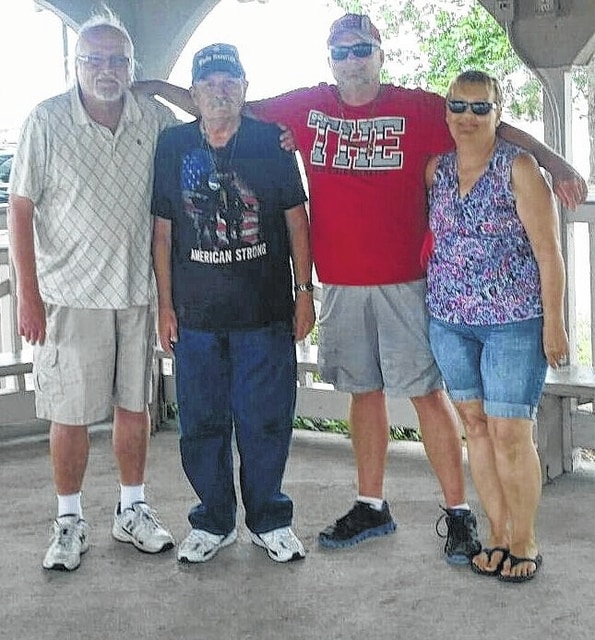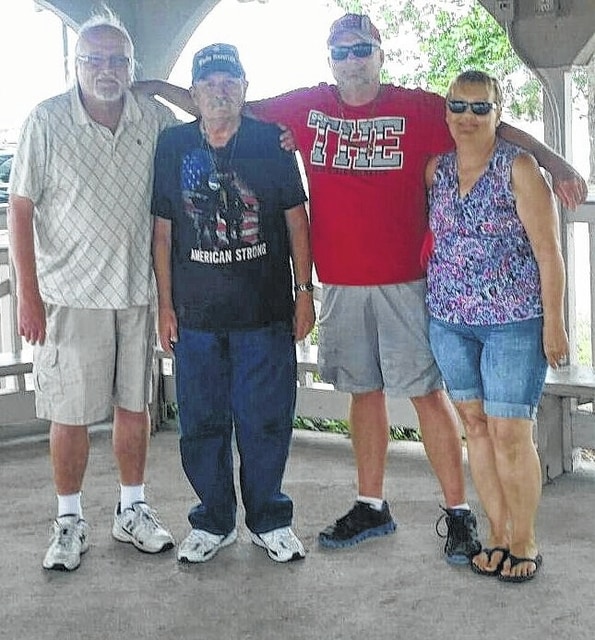

SIDNEY — “Genealogy Roadshow,” the popular PBS-TV program on which everyday people find their ancestral roots, has nothing on the Shelby County Genealogical Society (SCGS).
The society recently helped a Celina woman find long-separated family members who then met her for the first time at a reunion this month.
Elizabeth Dicke knew she had been adopted as a toddler from the Shelby County Children’s Home. Her adoptive parents, Elizabeth and Paul Dicke, had raised her in Celina. The older Dickes are now deceased and the younger Elizabeth has grown children of her own. She wanted to establish a medical history for them, but she had no idea who her birth parents were.
“It’s very strange to grow up all your life and not know your family,” Dicke said. “My (adoptive) father would tell stories about how he muddied up the license plates and drove a long time (from the children’s home) before he brought me back to the house.” He didn’t want to be followed. She doesn’t know why he was so scared.
In order to learn anything about her birth parents, she had to find out their names. She got help from the Mercer County Health Department who provided her birth certificate and adoption papers. She discovered that she had been born to Betty Jane (Michael) and Lawrence D. Foreman in Newark. They had named her Sandra Kay.
Internet searches didn’t give Dicke much more information, so she contacted SCGS. Member Phil Abbott, of Sidney, took up the quest.
“Our book, ‘Shelby County Children’s Home Register of Inmates, 1893-1962’ listed four Foreman children, ages 6 to 13, entering the home on Feb. 23, 1960,” Abbott wrote in ShelbyAnna, a society newsletter. “Sandra Kay was not among them.”
Abbott searched through 70 years of Sidney and Shelby County directories, microfilmed newspapers and marriage license records.
“We pieced together several generations of Foreman families in Shelby, Logan and Auglaize Counties, many of whom were buried at Glen Cemetery in Port Jefferson,” he wrote.
He found that Dicke’s birth father had served in World War II and died in 1982 in the Chillicothe Veteran’s Hospital. He is buried in Port Jefferson. Dicke later discovered that her birth mother is also deceased.
“Phil was helpful,” Dicke said. “I took the things that he found, then looked them up online to see if I could make connections with a wife or exwife or child. What Phil gave me helped point me in the right direction.”
They each combed through records on Ancestry.com and FamilySearch and compared notes on addresses of possible relatives.
Dicke had known that she had a younger brother. But she and Abbott discovered two half-brothers, two more full brothers and a sister. One brother and the sister are now deceased.
Lawrence Foreman lives in Ottawa; Roger Foreman, in Lima; David Gilpin, in Greenville; and Charles Foreman, in Lancaster. Lawrence, Roger and David met with Dicke, July 16, for a reunion. The brothers knew each other. Lawrence and Roger had grown up together in the Shelby County Children’s Home. David had been adopted. But Dicke, who was adopted at 15 months old, didn’t remember any of them.
“It made it (a different type of reunion) for me, to be with people who are still strangers,” she said.
What she did remember was being rocked in a rocking chair, set near a door.
“I used to spend hours rocking you,” Roger told her during the reunion.
“Was the rocking chair near a door?” Dicke asked.
“Yeah,” Roger replied. He had been 12 at the time.
The men told Dicke what they knew of their parents and grandparents. It had not been a good home with Betty Jane and Lawrence D.
“I learned my dad was a hard worker. He did the best he could to take care of his family,” Dicke said. “They told nice stories about the Michaels, my mother’s parents.” But, she added, what she found out about her mother wasn’t very good.
It was not unusual in the 1950s and 1960s for parents who couldn’t support their children to drop them off at the county home. Sometimes, the parents would take them back when things got better. At one point, Betty Jane wanted to take her boys back, but Roger refused to go.
“My (adoptive) parents did their best to keep from me things that weren’t good for me (to know). Questions my (adoptive) mom wouldn’t answer, they make sense now,” Dicke said. “I’m still trying to digest it all. It’s a lot to take in. In a way, it was a blessing that I was adopted. (My birth parents) had gone through so, so much. I made a comment (to my brothers) that maybe my father knew in the long run that (being in the children’s home) was the best because he knew you’d be fed and safe.”
Her brothers told her she looks a lot like their mother. They found it hard to call her “Elizabeth.” During the reunion, they called her “Sandy.” That’s what they had always known her by.
“I can’t make them understand I’m not Sandy. I’m Elizabeth,” Dicke said.
She cautions people who want to find their birth families to be prepared to take the good and the bad of what they discover.
“I wouldn’t discourage them. But I would say not to have an expectation that ‘I’m going to find my mother, sister, father, brother and that’s it’s going to be great,’” she said.
For Abbott, the project was a step away from his usual research.
“It’s the first time I’d worked on (finding) living people,” he said. “I do genealogy research, so I’m working with people who have been dead 50, 100, 200 years. This seemed more like detective work.”
His next project is to compile details on an adoption from the 1880s.
“That’s more my line,” he said. Currently, he is the sole researcher in the SCGS and he’s swamped with requests for help. He hopes that stories like Dicke’s will spur people to join the society, people who are interested in finding their own roots and helping others to find theirs.
“You can learn to do research. If they join, we’ll help each other on research,” he said.
The society meets monthly, on the second Tuesday, at 7 p.m., in the Ross Historical Center, 201 N. Main Ave. All meetings are open to the public. For information, call 937-498-1653.





